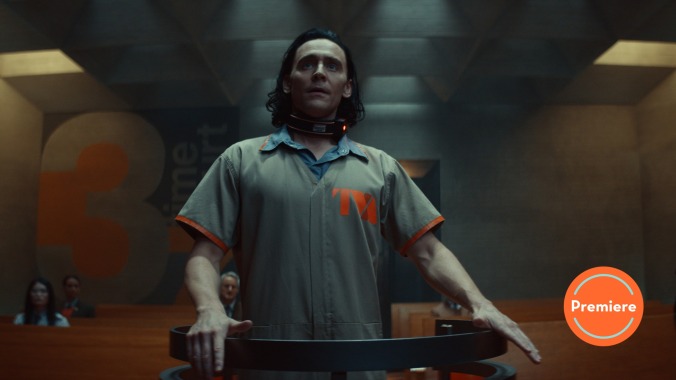Kneel before Loki’s impressively confident premiere
If "Glorious Purpose" is any indication, this is going to be a hell of a fun ride


For a man known for dying, Loki has an uncanny survival instinct. He fell off the Rainbow Bridge at the end of Thor only to somehow reappear leading an army in The Avengers. He was stabbed on the battlefield in Thor: The Dark World only to implausibly wind up on the throne of Asgard. And now he’s back on our screens even though he died in Avengers: Infinity War. Though Tom Hiddleston’s take on the God of Mischief is one of the most beloved characters in the MCU, it’s kind of remarkable just how much of Loki’s story has taken place offscreen between films. So even though Loki has had a lot more screentime than Wanda or Vision did before Marvel expanded their stories with WandaVision, it makes sense that he’d be on the docket for a Disney+ show. Loki promises to dig into the kind of survival story the MCU usually skips over when it comes to Loki (think of how he ingratiated himself with the Grandmaster offscreen in Thor: Ragnarok). And if this premiere is any indication, it’s going to be a hell of a fun ride.
Story-wise, there’s actually not much to this confidently contained premiere. Head writer Michael Waldron and series director Kate Herron have two big goals here. One is to introduce the hilariously convoluted bureaucracy of the Time Variance Authority or TVA. And the other is to reintroduce Loki—specifically Loki as he was in 2012’s The Avengers, which is the version that managed to escape his preordained timeline during the team’s time heist in Avengers: Endgame. This premiere is essentially 45 minutes of exposition, much of which is just clips from past Marvel movies. What’s impressive is that it never feels like a drag. After all, if you’re as deep down the Marvel rabbit hole as I suspect a lot of this show’s viewers are, part of the fun is in watching the franchise revisit and recontextualize its own past.
It helps that Loki is incredibly funny. In place of the strained attempts at banter that so often dragged down The Falcon And The Winter Soldier, Loki is filled with the kinds of hilariously subversive beats you’d expect from a writer who got his start on Community and Rick And Morty. A lot of the humor comes from the strange world of the TVA, who pick up the Endgame version of Loki as a “timeline variant” who must be dealt with in order to preserve the “Sacred Timeline” as established by their godlike alien overlords, the Time Keepers. This premiere gets a ton of mileage from Brazil-like sequences satirizing the absurdity of bureaucracy, my favorite of which is a bored employee who casually intones, “Please sign to verify this is everything you’ve ever said”—a joke the show then goes on to keep plussing.
The other big source of the show’s humor are its two stars. I wouldn’t have thought of Tom Hiddleston and Owen Wilson as a natural comedic duo, but it’s remarkable how much chemistry they generate together in just a handful of scenes. Hiddleston’s always had a knack for undercutting Loki’s Shakespearean import with an offhanded line delivery (“What if I was a robot and I didn’t know it?”), but that comedic subversion shines even brighter when paired with Wilson’s signature Texan breeziness. Wilson is also a master of underplaying things in a way that makes them funnier (“Big metaphor guy. I love it. Makes you sound super smart”), and he brings an entirely new energy to Marvel’s lengthy roster of mysterious mentor figures.
While characters usually react to Loki by going big to match his inherent theatrics, Agent Mobius approaches him with the energy of a Little League coach telling a troubled kid, “Come on, buddy, I’m rooting for you.” Mobius sees potential in Loki, which isn’t something the put-upon Asgardian is used to. And like the ghosts in A Christmas Carol or Clarence in It’s A Wonderful Life, Mobius gives Loki the chance to reflect on the twists and turns of his strange life path.
It’s a meta reflection of what the show itself is trying to do. Loki wants to take the many different versions of Loki that have existed across the various Marvel movies and make them make sense as one coherent character. To explain how the tragically villainous Loki of Thor could become the spitefully murderous baddie of The Avengers could become the Loki who died a hero in Infinity War. This premiere implies that Loki is going to be a character-driven show first and a mystery-driven one second, which is an exciting and unexpected decision for a series with such a timey wimey setup. Loki is here to have fun, but—like its titular hero—it has hidden depths, too.
Though it’s not apparent at first, this premiere is essentially one long therapy session that’s all about breaking down Loki’s defenses to a place where he can admit that he doesn’t hurt people because he enjoys it, but because he’s afraid of being powerless. His ultimate illusion is tricking people into thinking he’s an all-powerful god, not a scared kid with a debilitating outsider’s complex. One scratch in Loki’s armor comes when he sees a drawer full of spare Infinity Stones and realizes the TVA is more powerful than he ever could’ve imagined. (It’s the simple, surreal image that fully sold me on the show.) The other comes when he gets a glimpse into his preordained MCU future—accidentally sending murderers to his mom’s door, banishing his dying dad to Earth, and ultimately being killed by the very Titan who bankrolled his first attempt to invade Earth.
It’s here where Hiddleston’s dramatic skills (and Natalie Holt’s melancholy score) start to pay dividends as Loki tearfully watches the good and bad of his original timeline play out in fast-forward. The end of this premiere captures the energy of my very favorite Loki moment in the entire MCU; the scene in Thor: The Dark World where Thor gets his brother to drop the illusion of arrogant perfection and reveal he’s actually an emotional mess after their mom’s death. Once Mobius gets Loki to that same place of vulnerability, he offers him a chance to channel his pain into something productive. And that’s when the show drops the other shoe: The dangerous “fugitive variant” who’s been killing TVA agents is actually another version of Loki.
It’s an idea foreshadowed by an early scene where a 16th-century French boy tells Mobius that the killer was a horned devil who gave out gifts, which in retrospect totally sounds like Loki. But it still comes as a shock because it seems so unlikely that the TVA would let another version of Loki get away when they’re so good at containing this one. The end of this premiere leaves plenty to speculate about. Is this other Loki splintered from a different moment in time? Is he an older version of the Loki we’re watching right now—one who has a knowledge of how the TVA works and a potential grudge against the organization? Also, why don’t TVA desk agents know what fish are?
We also don’t even really know what Loki is going to look like as an episodic series now that its prologue is out of the way. But this episode lays solid groundwork for wherever the show goes from here. Loki’s premiere combines the tactile world-building of Guardians Of The Galaxy with the offbeat humor of Ant-Man and the meaty character reflections of Iron Man 3. It’s a sort of best-of Marvel smorgasbord with an impressively cinematic look, two compelling central performances, and a tone all its own. Loki may be burdened with glorious purpose, but Loki’s premiere makes the balancing act look easy.
Stray observations
- My credentials for reviewing this show are that I love time travel and think Thor: The Dark World is the seventh best MCU movie. Make of that what you will.
- I love that the trailers for Loki foregrounded his appearance as real-life hijacker D.B. Cooper as if it was going to be a major TVA mission, only for this episode to reveal it was basically just a prank he and Thor did for fun back in the 1970s.
- I also love that Loki figured out the Avengers time traveled back to 2012, but assumed they did so to stop him from invading Earth, rather than just to steal the Tesseract. It’s a nice way to show both his perception and his arrogance.
- I’m very excited to see what this show has in store for Lovecraft Country’s Wunmi Mosaku as Hunter B-15 and Beyond The Lights’ Gugu Mbatha-Raw as Judge Ravonna Renslayer. They’re two phenomenal actors who deserve bigger profiles. And while they don’t have much to do yet, I love the tossed-off way Mbatha-Raw pronounces “Laufeyson.”
- The great ’60s-inspired “Miss Minutes” TVA informational video (which also has shades of Jurassic Park’s Mr. DNA sequence) warns that a “Nexus event” could “branch off into madness” and lead to “another multiversal war” between “countless unique timelines.” Given that WandaVision featured a commercial for Nexus antidepressants and Waldron is next writing Doctor Strange In The Multiverse of Madness, it feels like that’s going to be important!
- In addition to Brazil, this episode also has big Umbrella Academy vibes. I could totally see Eugene Cordero’s Casey hanging out with Ken Hall’s Herb.